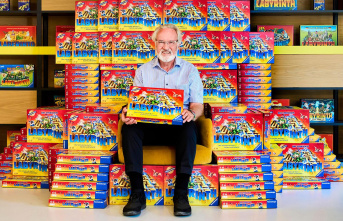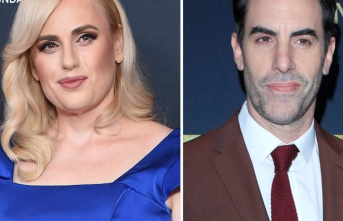How superhuman the rapper Eminem is is shown by the fact that even two words from his super hit "Lose Yourself" are enough to open his own restaurant.
Long queues have been forming in front of "Mom's Spaghetti" in downtown Detroit for the past year, despite the not-so-appetizing lyrics: "His palms are sweaty, his knees are weak, his arms are heavy/ There's puke on his sweater, mom's spaghetti," rapped Eminem early millennium.
"Lose Yourself" became arguably Eminem's most influential song - it's about that one moment that can change everything if you put your mind to it. The musician himself took his chance and became one of the most legendary - and controversial - rappers of his generation. He will be 50 on October 17th.
A tough childhood and youth in Detroit
Marshall Bruce Mathers III was born. 1972 in St. Joseph, Missouri. His childhood and youth were marked by poverty and allegations of violence and abuse. The family moved to the troubled city of Detroit, Michigan, where Mathers showed his talent performing in clubs at 14 and making his mark on the rap scene. Meanwhile, school didn't interest him, he repeated several classes and finally dropped out altogether.
Eminem's first album "Infinite" didn't lead to the hoped-for breakthrough in 1996, but when he won second place at the "Rap Olympiad" in Los Angeles a year later, hip-hop father Dr. Dre noticed him. Dre recorded Mathers, the album "Slim Shady LP" with the hit "My Name Is" was released in 1999 with Eminem's talent and Dr. Dre's authenticity on the scene to one of the albums that has been dubbed Megaseller in hindsight. In addition, Grammy's and MTV Video Music Awards rained down.
A year later, the "Marshall Mathers LP" was the fastest-selling rap album in American history - including controversial songs like "The Real Slim Shady" and "Stan". Those years -- including Eminem's acting debut in the semi-autobiographical film 8 Mile -- would be the pinnacle of his career and cement his image as a white child prodigy in African-American-dominated rap.
A squeaky clean climber story
Activists repeatedly accused Eminem of homophobic and misogynistic texts. Allegations that the musician tried to counter, among other things, in a duet with gay singer Elton John at the Grammys in 2001.
Elsewhere, Eminem caused a stir with a gesture for human rights: At the end of the Super Bowl halftime show with Dr. He got on his knees for Dre and Snoop Dogg - apparently in support of former US football player Colin Kaepernick. He initiated this gesture in 2016 as a sign of protest against racism and social injustice and was sharply attacked, especially by the American right.
From the Detroit underclass to the biggest stage in the world: There is rarely such a sparkling clean rise story as Eminem's in America. She brought authenticity to Marshall Mathers, and his style and talent even inspired young presidential candidate Barack Obama before the all-important TV debates against his opponent John McCain.
In his autobiography A Promised Land, Obama writes that before every performance he listens to "Lose Yourself" - the song about taking the one big opportunity in life. Obama describes how he sat in the car on the way to the debate sites and nodded to the beat of Eminem. He felt "an air of private rebellion, a connection to something darker and more real than all the excitement and awe that surrounded me now. It was a way to break through the artificiality and remind myself of who I was."












